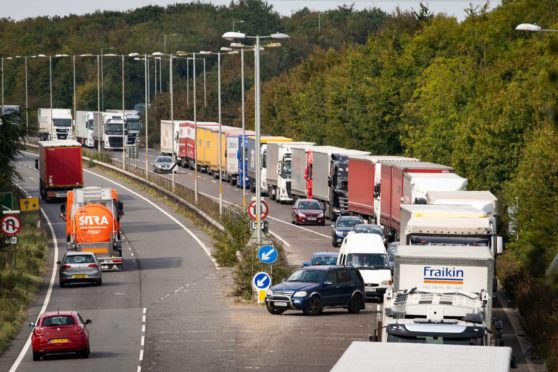Brexit disruption at the border is “likely” to get worse in the weeks ahead – despite assurances otherwise from the UK Government, industry bosses have warned.
A senior figure at the Road Haulage Association (RHA) in Scotland says British exports to the continent had been “artificially low” this month because of Covid and caution over the new customs requirements.
RHA director Martin Reid says firms had been “frightened to move goods” to the EU due to the increased level of paperwork and potential for a shipment to fall foul of red-tape.
As a result, there has been a surge in empty HGVs crossing the Channel from Britain in January – with 50% of lorries carrying only ‘fresh air’.
Mr Reid says as pre-Brexit stockpiles start to diminish in the weeks ahead, queues at the borders would start to increase.
So, how do we end January?
➡️Scared of Feb & Mar, terrified of April
➡️Business confidence either side of Channel badly wounded
➡️EU customers going elsewhere
➡️EU trade is now slow & costly and, at worst, just a high-stakes, long-odds gamble.But, hey, the fish are happy😔
— James Withers (@scotfoodjames) January 29, 2021
“Goods are not moving at the moment, there are so many stranded products that would normally be in the supply chain that are not moving because companies in GB are not comfortable with the new customs requirements” explains Mr Reid.
“The reason 50% of lorries moving through the short straits are empty is because EU hauliers are coming in with the exports, dropping them and because things are so complicated getting back with a full load, they’ve decided not to leave without.”
He adds: “People are frightened to move these goods in case they have the responsibility or the financial penalties attached to these goods not going through.
“As stockpiles go down, you will likely start to see delays.”
Despite exports having been artificially low in January, UK Government officials now believe it is “extremely unlikely” the worst-case scenario of 7,000-truck-long queues will come to pass.
A government spokesperson says: “Overall businesses have adapted well to the changes, and it is increasingly unlikely that our reasonable worst case scenario will happen.
“However, we are prepared for all scenarios and we appreciate that some businesses are facing challenges with specific aspects of our new trading relationship with the EU, and we are pulling out all the stops to help them adjust.”
Mr Reid says those comments “will bear little or no resemblance to what the vast majority will end up experiencing.”
